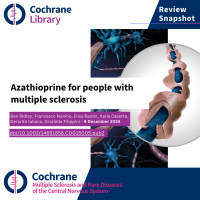
Multiple sclerosis (MS) is a chronic, inflammatory disease that affects both the brain and the spinal cord. It especially affects women and causes a range of symptoms that can either gradually get worse, which is referred to as “progressive multiple sclerosis” or relapse and remit repeatedly, which is referred to as “relapsing-remitting multiple sclerosis”. Over time, it can lead to issues of mobility and cognitive decline.
Azathioprine is an immunosuppressant drug that can be used to treat patients with multiple sclerosis. Its availability may be particularly useful for people with multiple sclerosis who live in countries in which licensed and approved disease-modifying drugs (DMTs), such as interferon beta, are unavailable or scarce. This review aimed to find out whether azathioprine could be an effective and safe treatment for multiple sclerosis.
The review included 8 randomised controlled trials and 6 non-randomised controlled studies of intervention.
Azathioprine was compared with either no intervention at all, placebo or other DMTs. More specifically, it was assessed as a first-choice treatment in comparison with other DMTs or placebo for people that hadn’t been treated with other drugs before or as a “switching” treatment for relapse-remitting MS. Both types of multiple sclerosis, relapsing-remitting and progressive were considered.
The outcomes the researchers were interested in were disability, relapse, serious adverse events, short-term adverse events, long-term adverse events, quality-of-life impairment and mortality.
Based on a limited amount of evidence, the review concluded that in people with relapsing- remitting multiple sclerosis azathioprine as a first-choice treatment may provide a modest reduction of the frequency of relapses and possibly increase the number of people with serious adverse events when compared tointerferon beta. However, the certainty of evidence on these outcomes turned out to be low or very low.
As for disability progression and short-term adverse events, evidence was very uncertain, although it was said that azathioprine could “possibly” decrease their numbers. It should be noted that these results concern relapsing-remitting multiple sclerosis.
Since data on the benefits of azathioprine over DMTs other than interferon beta are lacking, the authors concluded that more research is needed to provide robust evidence. It was also concluded that clinical trials on people with progressive multiple sclerosis are warranted.
This article serves as a summary of the following systematic review named “Azathioprine for people with multiple sclerosis” which was published in 2024 in the Cochrane Database of Systematic Reviews and authored by Ben Ridley, Francesco Nonino, Elisa Baldin, Ilaria Casetta, Gerardo Iuliano and Graziella Filippini.
Written by Amina Taguirov.
